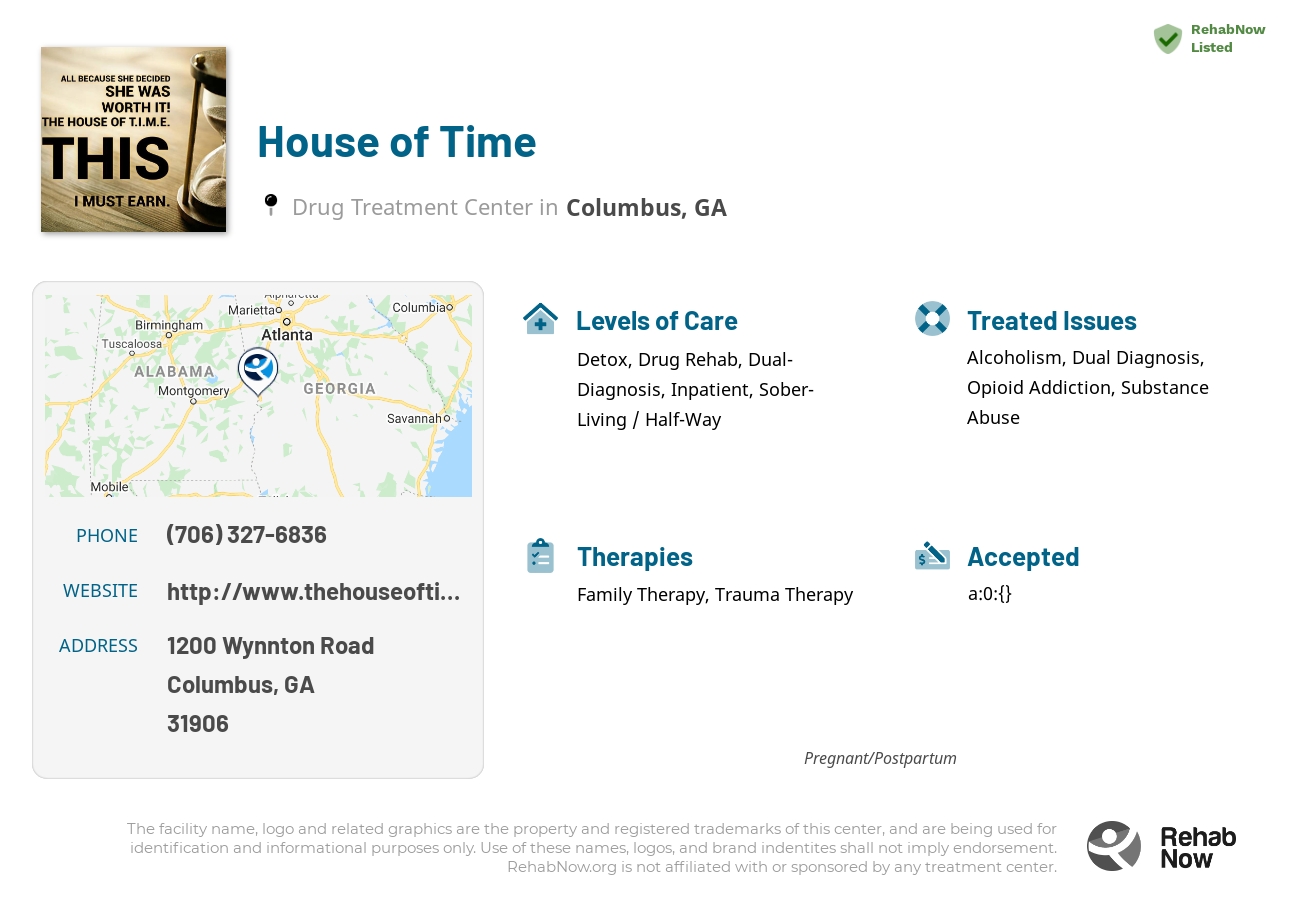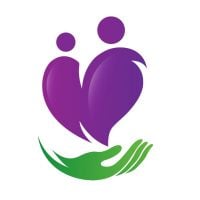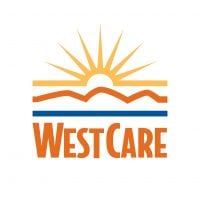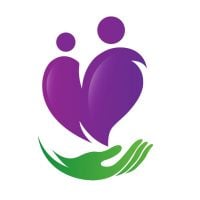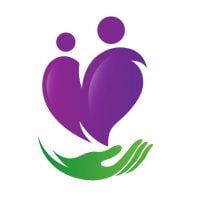House of Time
Drug Rehab Center in Columbus, Georgia
House of Time is a comprehensive addiction treatment facility in Columbus, Georgia, offering detoxification, inpatient and outpatient rehab, and aftercare support, staffed by a multidisciplinary team of addiction specialists and providing a wide range of treatment services such as individual and group therapy, cognitive-behavioral therapy, and trauma-informed care.
About This Georgia Facility
House of Time is an addiction treatment facility located in Columbus, Georgia that was founded in 1994. The facility aims to provide support and care to individuals suffering from various addiction disorders such as alcoholism, opioid addiction, substance abuse, dual diagnosis, and drug addiction. At House of Time, individuals can expect a range of levels of care including detoxification services, inpatient rehabilitation programs, dual-diagnosis treatment options, as well as sober-living and halfway house options for ongoing recovery support.
At House of Time, individuals struggling with addiction and substance abuse can find a comprehensive range of services tailored to their needs. The facility offers detoxification programs to assist patients in safely and comfortably withdrawing from drugs or alcohol. For those who require more intensive treatment, they provide inpatient rehabilitation programs that offer a structured environment and therapy sessions. Additionally, House of Time specializes in dual-diagnosis treatment for those with co-occurring mental health disorders alongside addiction issues. They also offer sober-living and halfway house options as support for individuals transitioning back into society after completing their primary treatment. Through their various levels of care, House of Time strives to help individuals achieve long-term recovery and regain control over their lives.
Genders
Ages
Modality
Additional
Conditions and Issues Treated
A drug abuser needs help because if no one helps them, they will not leave their vicious circle.
People who abuse drugs are likely to suffer from an addiction, which can cause serious health problems. It can also cause quarrels with people around them. It is common for drug abusers to have difficulty holding down jobs or relationships, but sometimes people around them can be quite tolerant. There are cases where the families of the drug abusers do not want to see them get any help, and the subject becomes controversial.
When it comes to helping drug abusers get sober, there are many options to choose from. It is essential to state that there is no “correct” way of doing things. People are different, and they need different types of help to get over their addiction.
Opioid addiction treatment should be done in a medically supervised drug rehab. Opioid addiction treatment will include detoxification and drug rehab counseling to help both the user and their loved ones learn how to live a successful sober lifestyle. Methadone, buprenorphine, and naltrexone are three medications that can help treat opioid addiction. Individual drug rehab counseling sessions can be helpful to discuss any questions or concerns with the drug treatment program.
When addiction and psychiatric issues co-occur, the addict’s recovery is more successful when both conditions are treated. A dual diagnosis refers to a condition in which the patient is diagnosed with two health issues: addiction and bipolar disorder.
Usually, dual diagnosis sufferers are prescribed a combination of treatments for each condition. The most common therapies are psychotherapy, behavioral therapy, spiritual counseling, 12-step programs, and medication management.
Psychiatric conditions are an obstacle to recovery because they can create roadblocks to a healthy lifestyle. Drugs and alcohol may be used as a means of self-medication, which can have dangerous consequences. Over time, addicts build up a tolerance and suffer withdrawal symptoms when drug use is stopped.
With the proper treatment, dual diagnosis sufferers can overcome their conditions and achieve lasting sobriety.
Levels of Care Offered at House of Time
This center offers a variety of custom treatment tailored to individual recovery. Currently available are Detox, Drug Rehab, Dual-Diagnosis, Inpatient, Residential, Sober-Living / Half-Way, with additional therapies available as listed below.
Detoxification is the first step in drug addiction treatment. A controlled environment where symptoms can be managed with medication and close observation is provided by drug detoxification. Detoxification is an essential step in the recovery process, but it is also one of the most dangerous. Due to the potential danger, it’s critical to understand what detoxification is and how to complete it safely.
A detox program helps the person physically withdraw from drugs and helps them track their progress. So, suppose the person isn’t ready for sobriety (or relapses). In that case, the treatment professionals can catch it early and help re-orient them towards recovery.
Inpatient treatment is an option that provides addicts with a supportive environment in which they can stop using. This type of intensive care and supervision is appropriate for those who were unable to quit on their own or need more structure than they could get from outpatient treatment, such as the addict most in need of this level of care.
The goal of inpatient rehab is for the addict to stay focused on sobriety and remain free of mood altering substances. Inpatient treatment programs usually offer the following: detox, therapy groups, one-on-one counseling, medication management and aftercare planning.
Sober Living Homes are used in drug rehab to help former addicts maintain sobriety. The staff provides the residents with a safe and supportive living environment to learn how to live a sober life. The staff members also provide the residents with resources to equip themselves better to live a sober life. They also provide them with opportunities for exercise, many of which encourage learning coping mechanisms that will be helpful later on.
Residential treatment programs are those that offer housing and meals in addition to substance abuse treatment. Rehab facilities that offer residential treatment allow patients to focus solely on recovery, in an environment totally separate from their lives. Some rehab centers specialize in short-term residential treatment (a few days to a week or two), while others solely provide treatment on a long-term basis (several weeks to months). Some offer both, and tailor treatment to the patient’s individual requirements.
Therapies & Programs
Family therapy is a crucial part of drug treatment and getting sober. It is one of the most effective ways to help addicts stay on the path to long-term sobriety. When a drug addict decides that they want to try and get sober, it takes the support of every person they love to succeed. It can be incredibly difficult for loved ones to watch an addict go through the pain and suffering of withdrawal, but by being there with them and supporting them, they can help to make sure that the addiction never returns.
One of the most important parts of family therapy is the relapse prevention plan. During treatment, therapists and doctors will often sit down with the addict and their family to develop a plan in case the addict ever feels like they want to use again. This plan should involve steps the addict and family can take together to prevent them from relapsing in the future. An addict’s family can play a vital part in helping them to avoid relapse because they can spot the warning signs and help them get back on track before it becomes too much of a problem.
Trauma therapy helps people dealing with addiction by allowing them to confront the traumas of their past and move past them. It is important to note that trauma therapy should not be confused with PTSD (post-traumatic stress disorder) Rather, it is used to treat the effects of trauma, which are often at the root of addiction.
Additional Details
Specifics, location, and helpful extra information.
Columbus, Georgia 31906 Phone Number(706) 327-6836 Meta DetailsUpdated November 25, 2023
Staff Verified
Patient Reviews
There are no reviews yet. Be the first one to write one.
Columbus, Georgia Addiction Information
Prescription opioid use has caused a large increase in the total amount of overdoses in Georgia. Almost 12% of the Georgia population uses illicit drugs each year, and slightly over 3.5% also abuses alcohol at the same time. This does not include those who binge-drink at least once a month, which includes 20% of all Georgians.
Columbus, Georgia is one of the top cities for drug use and addiction. An average of 1 person died every day from a drug overdose in 2014. Marijuana, cocaine, crack cocaine, heroin, methadone, and oxycodone are the most abused drugs in Columbus. In 2011, an estimated 10.7% of adolescents aged 12-17 reported using an illicit drug. The type of rehab center you choose will depend on the severity of your addiction.
Treatment in Nearby Cities
- Jackson, GA (82.0 mi.)
- Glennville, GA (182.1 mi.)
- Forest Park, GA (87.4 mi.)
- Davisboro, GA (142.3 mi.)
- Atlanta, GA (95.1 mi.)
Centers near House of Time
The facility name, logo and brand are the property and registered trademarks of House of Time, and are being used for identification and informational purposes only. Use of these names, logos and brands shall not imply endorsement. RehabNow.org is not affiliated with or sponsored by House of Time.


